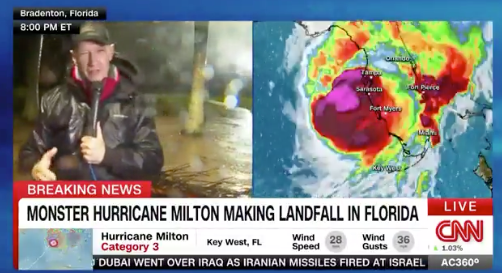
A suddenly roofless Tropicana Field. A construction crane toppling over and crashing into the Tampa Times offices. Those are some of the searing images that aired on the major networks when Hurricane Milton made landfall on the Florida Peninsula on Wednesday night as a Category 3 storm.
Even as coverage shifts into recovery phase, those moments will be forever associated with Milton’s devastating march across the state.
Now that the sun is up, here’s a 360-degree view of the damage Hurricane Milton caused to Tropicana Field’s roof and the inside of the ballpark. Absolutely heartbreaking 💔 pic.twitter.com/ZCtPHv6rE9
— Ryan Bass (@Ry_Bass) October 10, 2024
The cable and streaming news networks’ were in continuous coverage mode on Wednesday night into Thursday morning. And nothing signified Milton’s danger more than the presence of CNN’s Anderson Cooper, who was on-air for five hours from Bradenton, while chief climate correspondent Bill Weir reported from St. Petersburg.
Both were broadcasting live when they experienced Milton’s aggressiveness firsthand. Cooper was hit with debris while standing on the boardwalk, while Weir was struck by a strong blast of wind that moved him off-screen and cost him his hat.
CNN’s Anderson Cooper hit by debris during Hurricane Milton coverage on CNN in Bradenton, Florida. pic.twitter.com/1KHoxUGek8
— TV News Now (@TVNewsNow) October 10, 2024
Want to know what it feels like to be inside a hurricane? Turn on @CNN. Here’s @BillWeirCNN losing his hat a few minutes ago: pic.twitter.com/EZNnpz3K6e
— Brian Stelter (@brianstelter) October 10, 2024
Meanwhile, NewsNation’s Tampa-stationed Brian Entin had an interesting vantage point to share. At the height of Milton’s landfall, he and his crew managed to capture the bay without any water.
The water has been sucked out of Tampa Bay by Milton.
Happened fast. pic.twitter.com/8ghtF5SZYx— Brian Entin (@BrianEntin) October 10, 2024
Over on NBC News Now, senior national correspondent Tom Llamas and his crew were reporting from Sarasota when they had to seek shelter after a nearby transformer blew.

